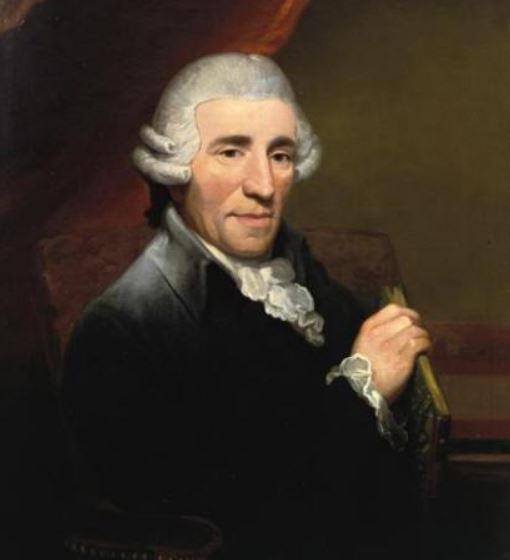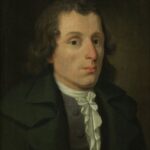Continuing our series on influencers in Beethoven’s life our next stop is Joseph Haydn. The two composers had turbulent relationship, young Beethoven pushed the gentle old Master to the limits, even making a fraud move behind his back.
Who was Joseph Haydn?
Franz Joseph Haydn (31 March 1732 – 31 May 1809) was a major Austrian composer in the classical era. His role in the history of music cannot be overestimated! He is called the Father of Symphony and the Father of String Quartets, even the sonata form was something he made known and common.
Haydn had labored in the palaces for a certain Hungarian nobleman called Esterházy for almost 30 years. He was a valued member of the household, nevertheless he was a servant just as any musician was treated this period. He wrote to a friend “I did not know … weather I am a Kapellmeister or Kapellservant. It is indeed said to be a slave!” In fact, compared to his previous life full with hardship and hunger, working for Esterházy was a break for Haydn.
When he gained his freedom after three decades he moved to Vienna at the age of 58. One day a certain person from London called Salomon knocked at his door and put the dream offer on the table. Haydn would come to London to compose, perform and enjoy the success. All this for a lot of money!
The Brits were just waiting for the opportunity. For years they were convinced that a talent as great as Haydn should not be kept behind walls at the Esterházy palaces. In fact London papers were openly writing about kidnapping Haydn and bringing him to London and freedom!
Haydn naturally accepted the invitation and said goodbye to Mozart, who was very worried about his old friend, saying you don’t know the language! To that Haydn replied my language is understood all over the World!
Haydn meets Beethoven
Salomon and Haydn on their way to London made a stop at Bonn exactly on Christmas Day in 1790. After a short stay Haydn continued his travel only to discover in London that he is more famous than he has ever imagined! Sure enough, during his short stay in Bonn Beethoven had the chance to shake hands with this great man.
Haydn stayed 18 months in England and enjoyed an unimaginable success! A poor village boy from Austria who worked for 30 years as a home musician now was on friendly terms with the King of England! On his way back to Vienna he once again stopped at Bonn. The local orchestra invited Haydn for a breakfast to Godesberg, which was a small spa village at the time. This is how Haydn and Beethoven met for the second time.
Beethoven played the piano and after showed some of his works to the old Master. Most probably it was the Joseph Cantata. The Elector was keen to send young Beethoven to the the imperial capital Vienna to learn and then return one day to be the Kapellmeister of Bonn, just as Beethoven’s grandfather was at his time.
Another great promoter was Count Waldstein who was willing to finance – together with the Elector – the the trip and the lessons. It is the same patron who soon wrote in his farewell letter to Beethoven you shall receive Mozart’s Spirit from Haydn’s hands!
This is how Beethoven left Bonn and started a new life in Vienna closing childhood and jumping into the major league.
Beethoven takes lessons from Haydn
After arriving to Vienna Beethoven secured a place to live, purchased a piano, some new clothes and right away started to look up all the contacts he received from Count Waldstein, his patron.
He soon started taking lessons from Haydn. These meetings had two aims. One is to practice counterpointing and the other one is to receive advice on pieces Beethoven was working on.
Haydn as a teacher, just as a person, was kind and patient. No wonder his pupils and friends called him Papa Haydn! Probably, Haydn noticed how Beethoven had the habit of taking previous themes and rebuild them into new ones. He himself had been composing with small melodic and rhythmic motifs, something he would later unpack and extend into a complete musical piece. Most probably they also discussed about forms like the sonata form, something Haydn himself represented and perfected. Proportion was another area that Haydn must have shown Beethoven, who previously had little sense of proportion and balance in a musical piece.
There is no record about these lessons, what was the structure of these meetings, nevertheless we know that a few months later Beethoven was already maturing into a sophisticated composer.
Haydn the unconscientious teacher, Beethoven the impatient student
Beethoven was not an easy student! He rejected authority – probably because of his abusive father – and he never liked to be told what to do. Also, he soon realized that Haydn was not a very precise composer, correcting counterpoint in his piano work was not perfect. Probably, Beethoven himself found more mistakes in his playing than his old teacher! After all, Haydn did not want any of this Beethoven business and he was not a conscientious teacher…
Although Haydn was a patient and good man he still had his other projects going on and could not dedicate enough time for this pupil. Another factor that influenced Haydn and his mood was the loss of a very beloved friend in 1793, Marianne von Genzinger. Both Marianne and Haydn were married, but they had at least a platonic love relationship. Haydn was well known to have a difficult marriage referring to his wife as that infernal beast!
There never was a complete break between the two composers, mostly because Haydn had excellent reputation throughout Europe and Beethoven was not dumb to pick a fight with such a composer. In 1793 Haydn even took Beethoven with him to Eisenstadt to the Esterházy palace to introduce this new talent to Prince Nikolaus II.
The fraud by Beethoven
In 1793, when it was time to send report to Elector Max Franz about the progress young Beethoven was doing the biggest tension between the two composers arose. Haydn wrote a letter describing the situation very rosy, saying that “in time Beethoven will fill the position of one of the greatest musicians in Europe”. Then he continues “I only wished that he might remain with me considerable time longer”. Haydn also describes the difficult financial situation of young Beethoven pointing to the fact that he even had to borrow some money from him. In order to continue the lessons and his stay in Vienna Beethoven should receive at least the double, 1000 florins as allowance. To support the promising development Beethoven was doing Haydn also forwarded some of the compositions Beethoven wrote during his stay in Vienna.
The reply of the Elector was a chilly one. He wrote “I received the music of young Beethoven that you sent me along with your letter, however the music except for the few was composed by him here in Bonn and was performed before he undertook his second journey to Vienna”. About the financial difficulties he wrote that it is indeed true that Beethoven was getting 500 florins for his Vienna studies, but there was another 400 florins that was his regular Court salary, totaling in 900 florins. This is something young Beethoven forgot to mention to Haydn! Then the Elector concluded, “I wonder therefore whether he should not begin his return journey here!”
Despite being a gentle soul as he was he cannot have been pleased about this reply! Not only did Beethoven borrow money from Haydn, but he lied to him about his true income and he lied to him about his homework compositions that he forwarded to the Elector! There is no written evidence concerning the aftermath, but we can be sure of the fact that Haydn was about to leave to England again, and before leaving he had to finish three new symphonies, helped to calm down the situation…
At the end Beethoven never return to Bonn, probably because the Elector had his own problems, to keep his electorate in the middle of a conflict with France, and because Beethoven quickly became Vienna’s beloved new hero.
The relationship between Haydn and Beethoven in later years
In many ways Haydn admired Beethoven, who had quick success in Vienna, something Haydn would work for decades to achieve. Behind his back the old Master called Beethoven Der Große Mogul, the Big Mogul, something of an ace or big shot in today’s slang.
In later years the matured Beethoven always referred to Haydn in terms of reverence and regarded him equal to Bach and Mozart. In 1809, on the birthday concert for Haydn he publicly knelt down before Haydn and kissed his hands. More on this in our article, here!
Beethoven has an enormous amount of debt to Haydn, something he never truly acknowledged or probably never fully understood.









